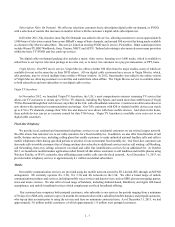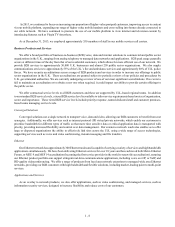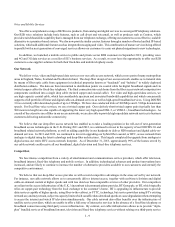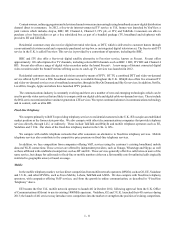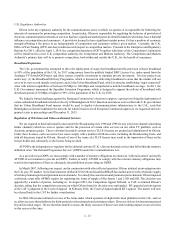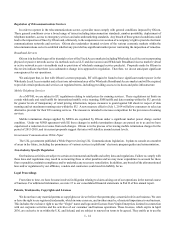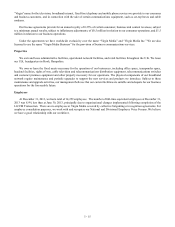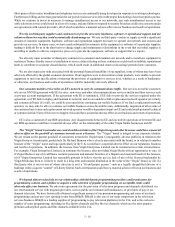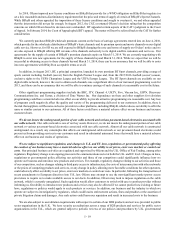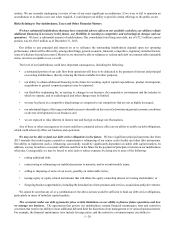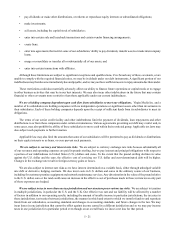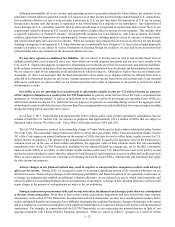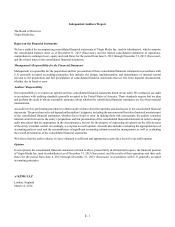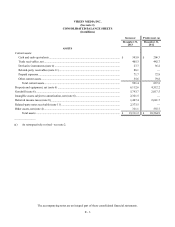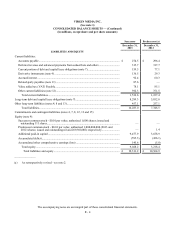Virgin Media 2013 Annual Report Download - page 19
Download and view the complete annual report
Please find page 19 of the 2013 Virgin Media annual report below. You can navigate through the pages in the report by either clicking on the pages listed below, or by using the keyword search tool below to find specific information within the annual report.I - 17
competition, the introduction of new technologies, the expansion of existing technologies, such as fiber-to-the-home/-cabinet/-
building/-node and advanced DSL technologies, or adverse regulatory developments could cause us to decide to undertake
previously unplanned upgrades of our networks and customer premises equipment. In addition, no assurance can be given that
any future upgrades will generate a positive return or that we will have adequate capital available to finance such future upgrades.
If we are unable to, or elect not to, pay for costs associated with adding new customers, expanding or upgrading our networks or
making our other planned or unplanned additions to our property and equipment, our growth could be limited and our competitive
position could be harmed.
Adverse economic developments could reduce customer spending for our digital cable, broadband, fixed-line telephony
and mobile services and increase churn, either of which could have a material adverse effect on our business, financial condition
and results of operations. Most of our revenue is derived from customers who could be impacted by adverse economic
developments globally, in Europe and in the U.K. Ongoing struggles in Europe related to sovereign debt issues, among other
things, has contributed to a challenging economic environment. Accordingly, unfavorable economic conditions may impact a
significant number of our customers and, as a result, it may be (1) more difficult for us to attract new customers, (2) more likely
that customers will downgrade or disconnect their services and (3) more difficult for us to maintain ARPUs at existing levels. The
U.K. may also seek new or increased revenue sources due to fiscal deficits. Such actions may further adversely affect our company.
Accordingly, our ability to increase, or, in certain cases, maintain, our revenue, ARPUs, RGUs, operating cash flow, operating
cash flow margins and liquidity could be materially adversely affected if the economic environment in Europe remains uncertain
or declines. We are currently unable to predict the extent of any of these potential adverse effects.
Our fixed-line telephony revenue is declining and unlikely to improve. Fixed-line telephony usage is in decline across the
industry, with the rate of decline in lines used by businesses being nearly twice as high as that in the residential fixed-line telephony
market. There is a risk that business and residential customers will migrate from using fixed-line telephony to using other forms
of telephony such as VoIP, or mobile telephony. There is no assurance that our fixed-line customers will migrate to our mobile
phones and they may eventually shift to other providers of mobile telephony services. Such a migration could have a material
adverse effect on our results of operations, revenue and financial condition.
A failure in our network and information systems, whether caused by a natural failure or a security breach, could
significantly disrupt our operations, which could have a material adverse effect on those operations, our business, our results
of operations and financial condition. Certain network and information systems are critical to our business activities. Network
and information systems may be affected by cyber security incidents that can result from deliberate attacks or system failures.
These may include, but are not limited to computer hackings, computer viruses, worms or other destructive or disruptive software,
or other malicious activities. Our network and information systems may also be the subject of power outages, fire, natural disasters,
terrorist attacks, war or other similar events. Theft of metals is particularly acute in the U.K. due to high prices for scrap metal,
and our network is not immune to such thefts. Such events could result in a degradation of, or disruption to, our cable and non-
cable services, and could prevent us from billing and collecting revenue due to us or could damage our equipment and data or
could result in damage to our reputation. Disruption to services could result in excessive call volumes to call centers that may not
be able to cope with such volume, which could in turn have a material adverse effect on our reputation and brand. Our plans for
recovery from, and resilience to, such challenges may not be sufficient. The amount and scope of insurance we maintain against
losses resulting from these events may not be sufficient to cover our losses or otherwise adequately compensate us for any disruptions
to our business that may result.
Sustained or repeated failures of our own or third-party systems that interrupt our ability to provide services to our customers,
prevent us from billing and collecting revenue, or that otherwise prevent us from meeting our obligations in a timely manner, could
materially adversely affect our reputation and result in a loss of customers and revenue. These network and information systems-
related events could also require significant expenditures to repair or replace damaged networks or information systems or to
protect them from similar events in the future. Further, any security breaches, such as misappropriation, misuse, penetration by
viruses, worms or other destructive or disruptive software, leakage, falsification or accidental release or loss of information
maintained in our information technology systems and networks or those of our business partners (including customer, personnel
and vendor data) could damage our reputation, result in legal and/or regulatory action against us, and require us to expend significant
capital and other resources to remedy any such security breach. As a result of the increasing awareness concerning the importance
of safeguarding personal information, the potential misuse of such information and legislation that has been adopted or is being
considered regarding the protection, privacy and security of personal information, the liability associated with information-related
risks is increasing, particularly for businesses like ours that handle a large amount of personal customer data. The occurrence of
any such network or information system-related events or security breaches could have a material adverse effect on our business
and results of operations.
Unauthorized access to our network resulting in piracy could result in a loss of revenue. We rely on the integrity of our
technology to ensure that our services are provided only to identifiable paying customers. Increasingly sophisticated means of


